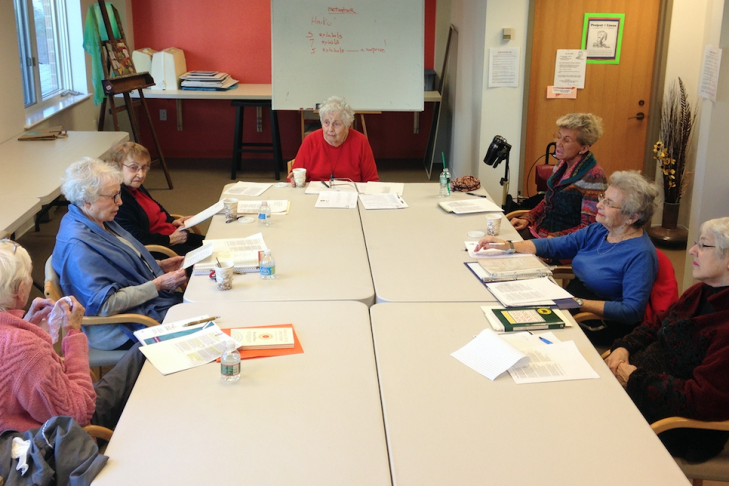Since moving to our senior living community, Joan has been at the helm of poetry and memoir writing workshops with fellow residents at Orchard Cove, many of whom are exploring creative writing for the first time. We caught up with her recently to talk about her life’s work and the workshop process.

How did the writing workshops at Orchard Cove come about?
Well, I love to teach. I was a poet in the schools in New York. First I was a special education teacher and I worked with troubled preschool children. I did that for 25 years. I was writing at the same time and starting to get published. And then I burned out and went into a second profession. I was a poet in the schools, a poet in public service, and a poet in Westchester Council of Arts.
A professional poet? That was a job?
Yes, it was paid! But it wasn’t posted in a classified ad. I was recruited and then once I joined Westchester Council of Arts I was recruited by other organizations to be a poet-in-residence. At that time, the late ’70s and early ’80s, there was a lot of public money for the arts. It was a very exciting time for poets and writers and artists in the schools. We were more or less making our own curriculum.
I collaborated with the teachers in the classroom. The whole idea was to get the teachers excited about poetry and then the teachers could carry on the work on their own. And then I taught a private workshop for teachers, which started off as a three-week grant, but they all wanted to stay, and we continued for 14 years as a private workshop in my home. They enjoyed it—I’m fun to be with.
How has teaching now at Orchard Cove been different from other teaching experiences in your life?
It’s a wonderful group. I must say they work really hard. I’m fun, but I’m a hard taskmaster. I give homework, quite a bit of it. I’ve been so thrilled with this particular group I’m teaching now. All the classes have been good, but this class really works hard. They revise their work over and over again. Their writing has just become so much clearer and so much more delightful to read.
How does it work?
We have 10 students in the class, which meets weekly. Students submit their work to the whole group, and then everyone talks about the work and tries to help that person strengthen their piece. Critiquing is very difficult to learn. You need to be positive but honest at the same time. So that’s what we focus on. They write about everything, their family experiences, their relationship with nature, their pasts, their wishes, their losses. I don’t tell them what to write. I just give them a structure.
Is there a publication of the work at the end of the course?
We have a reading. Our next reading is in April. At our last reading, last spring, we couldn’t accommodate all the people who came; we had to turn people away. Residents spilled out into the hall. This year we’ll have it in a larger room. We spent a lot of time practicing. Reading is an art in itself. You have to read slowly, loudly, project, and stand up straight. We had quite a few practices.
Do you have any advice for people just starting writing late in life or wanting to write their memoir?
I think if you are just starting and want to write your memoir, it’s a really good idea to join a group and get some guidelines with someone who is very understanding, who will give you a little bit of structure and encourage you in your work, as well as pointing out where you could be helped. Another good thing is to read a lot of memoirs by other people. Of course some people can do this without a group, but a group sometimes motivates people to keep going. In the summer, I go to the Providence Fine Arts Workshop and study with Julia Glass.
Another good idea when beginning is to start on just a piece of a memoir. Focus on one experience, one memory, rather than one’s whole life. Most people don’t write their entire life; it’s not an autobiography. A memoir is usually about a period of your life, a recounting of memory.
Can you share examples of what people are writing about in class?
No, it’s all confidential. I feel a writing group is a very safe space. I’m not a rules person but I do have three rules for my workshops: don’t talk about your piece to people outside the group, as that can undermine your writing or inhibit self-expression; don’t talk about anyone else’s work outside the group because that, too, is their private business; and in the case of this workshop held within a community, we don’t write about anyone who lives at Orchard Cove. That can be uncomfortable or embarrassing for the subject, even if the piece is a positive one. Those are the three cardinal rules.
I also recommend beginning a creative piece writing by hand rather than a computer. Because you think more slowly. When typing on a computer, it’s almost as if your words are ahead of your mind. You don’t go as deep as you do when you write slowly. Revisions are fine on a computer, but I recommend writing the first draft by hand.
Have your students become friends?
I think we all feel very close to one another. It’s an intimate setting. People feel close to one another and support each other. It’s certainly a feeling of camaraderie and support.
About Orchard Cove
Orchard Cove in Canton is a vibrant continuing care retirement community immersed in culture and creativity and built on a philosophy that choice, independence and a holistic approach to wellness leads to fulfilling and stimulating lifestyles. To learn more about life at Orchard Cove, including rental opportunities with Enhanced Living, contact David Calnan at 781-821-3202.
This post originally appeared on the Hebrew SeniorLife blog. Read more at blog.hebrewseniorlife.org.
This post has been contributed by a third party. The opinions, facts and any media content are presented solely by the author, and JewishBoston assumes no responsibility for them. Want to add your voice to the conversation? Publish your own post here. MORE



